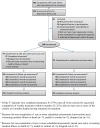Cognitive Behavior Therapy for Depression and Self-Care in Heart Failure Patients: A Randomized Clinical Trial
- PMID: 26414759
- PMCID: PMC4712737
- DOI: 10.1001/jamainternmed.2015.5220
Cognitive Behavior Therapy for Depression and Self-Care in Heart Failure Patients: A Randomized Clinical Trial
Abstract
Importance: Depression and inadequate self-care are common and interrelated problems that increase the risks of hospitalization and mortality in patients with heart failure (HF).
Objective: To determine the efficacy of an integrative cognitive behavior therapy (CBT) intervention for depression and HF self-care.
Design, setting, and participants: Randomized clinical trial with single-blind outcome assessments. Eligible patients were enrolled at Washington University Medical Center in St Louis between January 4, 2010, and June 28, 2013. The primary data analyses were conducted in February 2015. The participants were 158 outpatients in New York Heart Association Class I, II, and III heart failure with comorbid major depression.
Interventions: Cognitive behavior therapy delivered by experienced therapists plus usual care (UC), or UC alone. Usual care was enhanced in both groups with a structured HF education program delivered by a cardiac nurse.
Main outcomes and measures: The primary outcome was severity of depression at 6 months as measured by the Beck Depression Inventory. The Self-Care of Heart Failure Index Confidence and Maintenance subscales were coprimary outcomes. Secondary outcomes included measures of anxiety, depression, physical functioning, fatigue, social roles and activities, and quality of life. Hospitalizations and deaths were exploratory outcomes.
Results: One hundred fifty-eight patients were randomized to UC (n = 79) or CBT (n = 79). Within each arm, 26 (33%) of the patients were taking an antidepressant at baseline. One hundred thirty-two (84%) of the participants completed the 6-month posttreatment assessments; 60 (76%) of the UC and 58 (73%) of the CBT participants completed every follow-up assessment (P = .88). Six-month depression scores were lower in the CBT than the UC arm on the Beck Depression Inventory (BDI-II) (12.8 [10.6] vs 17.3 [10.7]; P = .008). Remission rates differed on the BDI-II (46% vs 19%; number needed to treat [NNT] = 3.76; 95% CI, 3.62-3.90; P < .001) and the Hamilton Depression Scale (51% vs 20%; NNT = 3.29; 95% CI, 3.15-3.43; P < .001). The groups did not differ on the Self-Care Maintenance or Confidence subscales. The mean (SD) Beck Depression Inventory scores 6 months after randomization were lower in the CBT (12.8 [10.6]) than the UC arm (17.3 [10.7]), P = .008. There were no statistically significant differences between the groups on the Self-Care Maintenance or Confidence subscale scores or on physical functioning measures. Anxiety and fatigue scores were lower and mental- and HF-related quality of life and social functioning scores were higher at 6 months in the CBT than the UC arm, and there were fewer hospitalizations in the intervention than the UC arm.
Conclusions and relevance: A CBT intervention that targets both depression and heart failure self-care is effective for depression but not for HF self-care or physical functioning relative to enhanced UC. Additional benefits include reduced anxiety and fatigue, improved social functioning, and better health-related quality of life.
Trial registration: clinicaltrials.gov Identifier: NCT01028625.
Figures


Comment in
-
Reframing Depression Treatment in Heart Failure.JAMA Intern Med. 2015 Nov;175(11):1782. doi: 10.1001/jamainternmed.2015.5240. JAMA Intern Med. 2015. PMID: 26414459 No abstract available.
-
Cognitive behavioural therapy shows promise in heart failure patients with depression.BMJ. 2015 Sep 28;351:h5163. doi: 10.1136/bmj.h5163. BMJ. 2015. PMID: 26419250 No abstract available.
References
-
- Freedland KE, Rich MW, Skala JA, et al. Prevalence of depression in hospitalized patients with congestive heart failure. Psychosom Med. 2003;65(1):119–128. - PubMed
-
- Haworth JE, Moniz-Cook E, Clark AL, et al. Prevalence and predictors of anxiety and depression in a sample of chronic heart failure patients with left ventricular systolic dysfunction. Eur J Heart Fail. 2005;7(5):803–808. - PubMed
-
- Koenig HG. Depression in hospitalized older patients with congestive heart failure. Gen Hosp Psychiatry. 1998;20(1):29–43. - PubMed
-
- Schowalter M, Gelbrich G, Stork S, et al. Generic and disease-specific health-related quality of life in patients with chronic systolic heart failure: impact of depression. Clin Res Cardiol. 2013;102(4):269–278. - PubMed
-
- Muller-Tasch T, Peters-Klimm F, Schellberg D, et al. Depression is a major determinant of quality of life in patients with chronic systolic heart failure in general practice. J Card Fail. 2007;13(10):818–824. - PubMed
Publication types
MeSH terms
Associated data
Grants and funding
LinkOut - more resources
Full Text Sources
Other Literature Sources
Medical
Molecular Biology Databases
Research Materials
Miscellaneous

